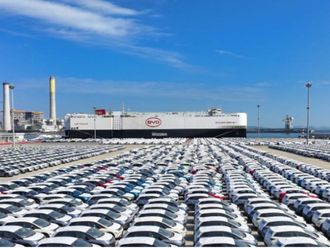New York: Oil tumbled about 4 per cent on Friday, after a Saudi prince reportedly said the kingdom will not freeze output without Iran and other major producers doing so, and data showed the global crude glut was likely to grow.
The dollar firmed after stronger-than-expected US
jobs data, which also weighed on oil early in the first session of the second quarter.
Brent crude for June delivery, the new front month contract for the global benchmark, settled down $1.68, or 4.1 per cent, at $38.67 a barrel. It fell 3 per cent for the week.
Brent finished the first quarter up 6 per cent and March 15 per cent higher.
US crude’s front-month settled down $1.55, or 4 per cent, at $36.79. It lost 7 per cent on the week, after gaining 4 per cent in the first quarter and 14 per cent in March.
Prices barely reacted to data showing US oil and gas rigs falling for a 15th straight week, reaching the lowest levels since at least the 1940s.
Data released separately by the US Commodity Futures Trading Commission showed hedge funds and other big speculators cut their net long position in US crude for the first time in six weeks during the week to March 29 as investors feared the rally may not continue.
Oil rebounded over the past two months from 12-year lows after major producers within and outside the Organization of the Petroleum Exporting Countries floated the idea of freezing output at January’s highs.
But Saudi Deputy Crown Prince Mohammed bin Salman said on Thursday the Opec kingpin will not join the program without the participation of Iran and other major producers, Bloomberg reported.
A meeting to discuss the production freeze has been scheduled in Doha, Qatar on April 17. Iran has maintained that it will not contribute to any freeze until its crude exports return to pre-sanction levels.
“I think the market interpreted the lack of Saudi reaction to the Iran position as meaning they are OK with the plan even if Iran is out,” said Dominick Chirichella, senior partner at the Energy Management Institute in New York.
“So, now we’re back to being consistent on what the Saudi position has been the last two years: That they’re going to let the market decide supply-demand. To me, any freeze is just psychological. All will agree but nobody will do anything.” Saudi Arabia and Kuwait said this week they will resume production at the jointly operated 300,000-barrel-per-day Khafji field.












